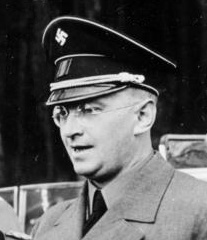Konrad Henlein
| Konrad Henlein | |
|---|---|

Freikorps leader Henlein, September 1938
|
|
| Reichsstatthalter and Gauleiter of the Reichsgau Sudetenland | |
|
In office 1 May 1939 – 8 May 1945 |
|
| Personal details | |
| Born |
6 May 1898 Maffersdorf, Bohemia, Austria-Hungary |
| Died | 10 May 1945 (aged 47) Pilsen, Protectorate of Bohemia and Moravia |
| Political party |
SdP (1933-1938) NSDAP (1939-1945) |
| Profession | Bank clerk |
| Religion |
Roman Catholicism (1898-1926) Protestantism (1926-1945) |
Konrad Ernst Eduard Henlein (6 May 1898 – 10 May 1945) was a leading Sudeten German politician in Czechoslovakia. Upon the German occupation he joined the Nazi Party as well as the SS and was appointed Reichsstatthalter of the Sudetenland in 1939.
The son of an accounts clerk was born in Maffersdorf (present-day Vratislavice nad Nisou) near Reichenberg (Liberec), in what was then the Bohemian crown land of Austria-Hungary. In light of his being a leader of the Sudeten German movement, Henlein's origin was not without problems: His mother, Hedvika (Hedwig) Anna Augusta Dvořáček, was the daughter of a German-speaking mother but her father was of Czech origin. As Henlein pursued a Germanisation policy to non-German Aryans after 1938, he was forced to change his still-living mother's name from Dvořáček to the more German spelling of Dworatschek, which would be more appropriate to Henlein's career as a high Nazi official.
Henlein attended business school in Gablonz (Jablonec nad Nisou) and in World War I entered military service in the Austro-Hungarian Army as a military volunteer (Kriegsfreiwilliger), assigned to k.u.k. Tiroler Kaiser-Jäger-Regiment Nr. 3. In May 1916 he attended Officer Candidate School and then was assigned to k.u.k. Infanterie-Regiment Nr. 27 based in Graz. He saw Italian Front service in the Dolomites at Monte Forno, Mont Sief, and Monte Maletta from May 1916 to 17 November 1917.
...
Wikipedia
